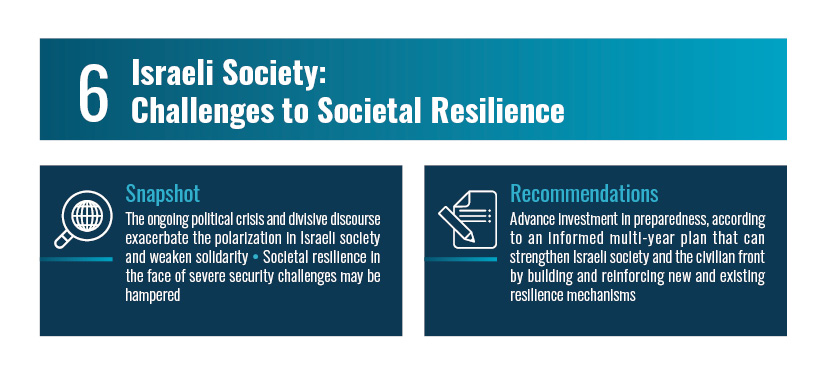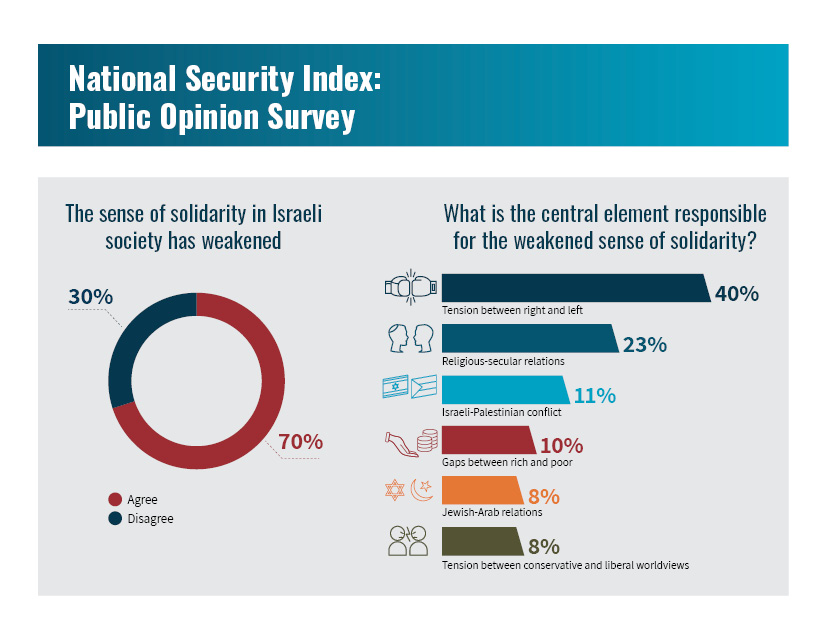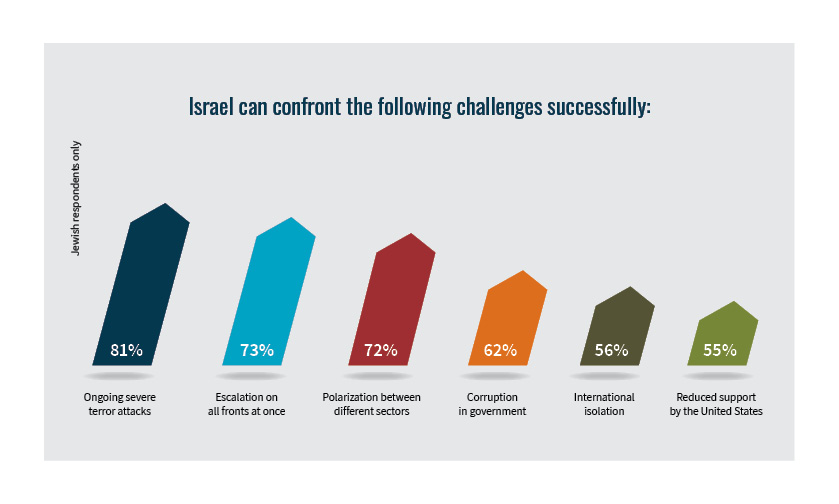Publications
Strategic Survey for Israel 2019-2020, The Institute for National Security Studies, January 2020
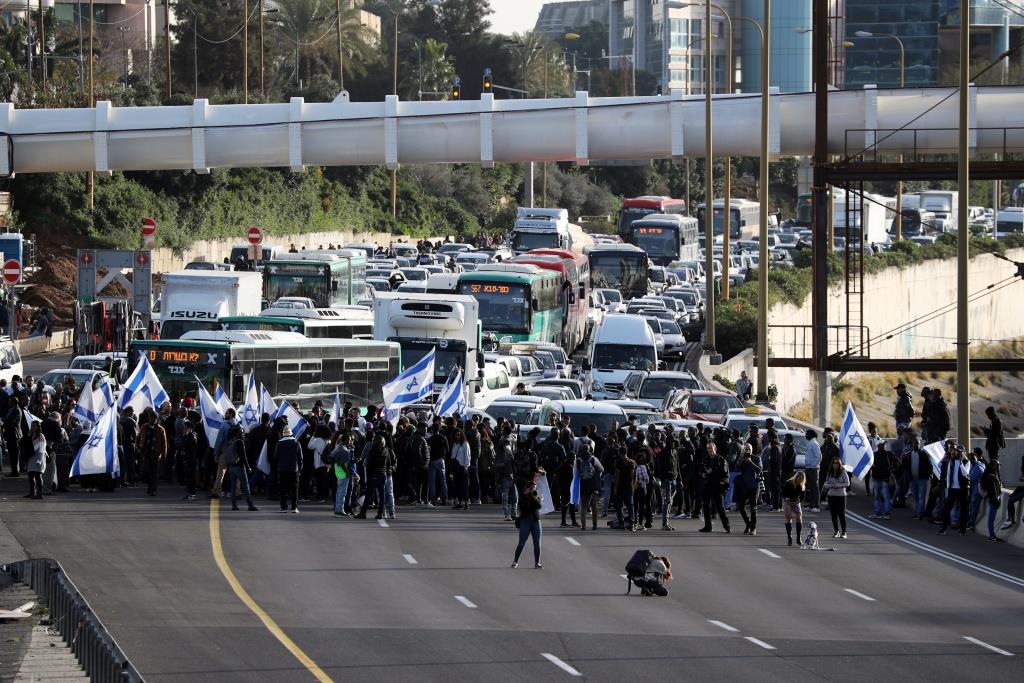
Israeli society in 2019 was characterized first and foremost by the broad implications of the ongoing political crisis, following two rounds of national elections and preparations for the third round in March 2020. This electoral impasse, unprecedented in Israel, involved not only the inability to form a coalition government, but also restricted the normal performance of government offices and the ability to make decisions on critical issues. Beyond this, the political stalemate exposed a series of profound deficiencies within society and its political and legal frameworks. This was aggravated even further by divisive, extreme, and superficial political discourse – both among politicians and their associates, and in the media – focusing mostly on the personal and legal issues relating to the Prime Minister.
In tandem, the past year was characterized by deepening public disputes stemming from diverse worldviews, especially regarding the necessary balance between national and religious values and democratic, liberal, secular ideals. There were further challenges to the need to respect human rights and ensure the limitation of government power. Under the banner of strengthened governance, executive and legislative steps were taken to restrict the legitimacy of criticism of the government on the part of established institutions such as courts, legal advisors, public attorneys, the state comptroller, the Israel Police, or organs of civil society. Concurrently, the trend of presenting particular figures and governing systems as opponents of the government and its policies continued. Branding critics as extreme opposition can have a chilling effect on their assessment and in certain cases even lead to restrictions of their role.
Such processes and trends threaten the foundations of Israeli democracy. According to the annual INSS National Security Index, conducted most recently in November 2019, those agreeing with the statement “Israeli democracy is in danger” increased from 40 percent in 2018 to 55 percent in 2019. Even if the Israeli democratic system appears strong, there is concern it is weakening, especially in light of similar global trends involving charges (usually on the part of populist and anti-establishment leaders) of “deep state” and criticism of the “elite” and the liberal order that were accepted for many years as the solid basis of Western democracies.
The Weakening of Israeli Solidarity
The past year also saw a further weakening of the sense of solidarity within Israeli society. This is typified by the socio-economic gaps between the rich and the poor and between the center and the periphery. The INSS National Security Index found that 70 percent of those surveyed agree with the assertion that “the sense of solidarity within Israeli society has declined.” The holes in social solidarity were evident this past year in the outcry of the Ethiopian community, which demonstrated against the “over-policing” of their people, and in the protest of the Arab sector against the state’s incompetence in addressing the increasing crime and violence in their community. Both examples share a common denominator, as the protests were perceived by the Israeli public as sectoral social phenomena. In the former case, the Ethiopians received limited support for their struggle from the Israeli public, while in the latter case, the Arab minority hardly received any public support from the Jewish community. Overall it appears that even if Israel is a state with significant internal robustness, this past year has seen more disconcerting signs that point to an accelerated trend of weakening social solidarity within social groups, between social groups and the state, and between the individual and the state.
The State of Israel’s sensitive relations with the multi-faceted Arab minority has experienced many fluctuations and profound changes. The relationship is shaped by three main trends, fraught with internal contradictions: first is the clear aspiration among Arabs in Israel, especially among the younger generation, for civil and even political integration – despite the low starting point and significant social, economic, and cultural barriers – along with their desire to maintain a separate national identity. The second reveals hostility and distance on the part of a large portion of the Jewish public toward the Arab minority, which reinforces and is in turn strengthened by exclusionary rhetoric and actions by the government and many in the political leadership (for example: the Nation-State Law, and decided resistance to inclusion of Arab parties in a government coalition). This is complemented by harsh rhetoric from Arab Israeli leaders. The third trend is the relatively successful implementation of the government decision on the economic development of minority populations in Israel 2016-2020 (Decision 922), which has already helped accelerate the Arab community’s integration within Israel’s social tapestry. This complex triangle creates clear progress toward economic and employment integration, along with signs of a willingness for social and even political integration within the state’s multilayered fabric. In the long term, these trends may advance the )still limited) legitimization of the Arab community in Israel. A substantive test of the state’s sensitive relations with the Arab sector will be how it addresses the increasing violence and crime within the community. Possible success in this crucial field depends greatly on joint efforts – still in their early stages – between the state’s institutions and the Arab community and its leaderships.
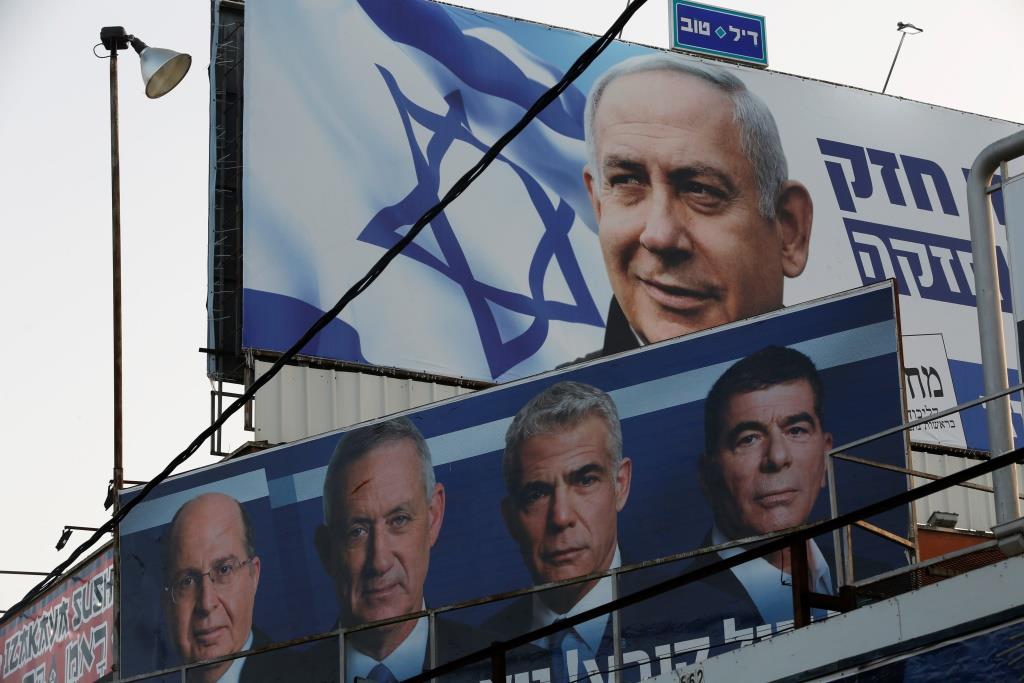
The Media Discourse
Significant changes are also highly evident in the media sphere. One example is the increasing number of media outlets and journalists identified with the conservative/right wing/religious stream, which contributes to the diversification of the discourse and provides a platform for populations whose voices were heard less in public in the past. At the same time, the media discourse, especially during the ongoing election periods, has become more extreme, thus exacerbating divisions in Israeli society.
In the security domain, the majority of the media has continued to toe the establishment line, rarely expressed alternative approaches, and generally contributed to the sense of unity within the Jewish society. This is mostly apparent during military crises. Overall, the media speaks within the boundaries of national consensus, strengthening national conceptions that are commonly voiced on the political right, representing the mood of “the entire world is against us,” “we will always live by the sword,” “we can rely only on ourselves,” and the like. Looking ahead, in the case of a widespread military conflict, it will be necessary to find a balance in the media between diversification of voices without blurring the differences of approach in society on the one hand and refraining from exacerbating divisions on the other.
![Israeltourism [CC BY 2.0]](https://www.inss.org.il/wp-content/uploads/2020/01/משבר-חוקתי-בישראל-דחוס.jpg)
The Economic Context
Israel of 2019 is flourishing relative to the developed countries. Production is growing, unemployment is at a low point, the credit rating is at an all-time high, net exports have been positive for many years, and inflation is low.
Nevertheless, the Israeli economy suffers from a series of weaknesses that constitute challenges to society. Chief among those is the large economic gap between different sectors, such as between Arabs and Jews, ultra-Orthodox and secular, and periphery and center populations, and between different employment sectors.
The government should consider ways to reduce the socio-economic gaps and increase the integration of ultra-Orthodox men and Arab women into the labor market and increase their productivity. In addition, it is essential to solve traffic congestion, which hampers productivity as it negatively affects the quality of life, and to lower housing costs. On these issues, no significant progress was evident in the past year, partly because of the political deadlock. Beyond that, the Israeli economy is dependent to a large extent on export, such that a global recession might adversely affect the local economic standing. In the military-economic sphere, the government must approve as soon as possible a multi-year IDF plan, which is supposed to respond to the growing security challenges on the one hand and be responsive to the economic needs on the other.
A Look to the Future
Without a solution to the ongoing political impasse, without preserving the requisite balance of the national identity of the State of Israel, and without enhancing social solidarity, serious concern will arise regarding potential further weakening of Israeli society. There are already signs of risks and crises in four main domains: undermining of the delicate balance regarding Israel’s identity as a Jewish and democratic state, especially in its tilting toward the Jewish pole at the expense of the democratic pillar; the deepening of social and economic gaps, especially in the event of a major economic crisis; the transformation of the public discourse in Israel into a violent struggle of hatred and exclusion of the “other”; and the consequent weakening of societal resilience in Israel.
These risks could create an even greater gap between the different sectors in Israeli society, and possibly also impact negatively on the increasingly sensitive relationship between Israel and Diaspora Jewry. The convergence of these discernible trends could result in reduced social and human capital in Israel and might weaken its capacity to stand up to internal and external threats.
Under conditions of a large-scale military conflict, public mobilization and the demonstration of support for the IDF would be expected, as in the past. However, a deterioration of the military and civil situation following a protracted conflict and wide-scale damage to the home front, particularly without sufficient civil preparedness, could jeopardize societal resilience in Israel. This could be reflected in a reduction of the state’s economic and civil abilities to manage daily life successfully during times of emergency and maintain functional continuity during a conflict. It could even disrupt the subsequent recovery process following the possible severe destruction of the national social and infrastructure systems.
Consequently, Israel should invest in system-wide preparation efforts, in accordance with an existing long range plan, so as to strengthen the preparedness of the civilian front in Israel. This plan would include the construction and empowerment of new and existing resilience mechanisms that are closely connected to the social dimensions discussed above.



